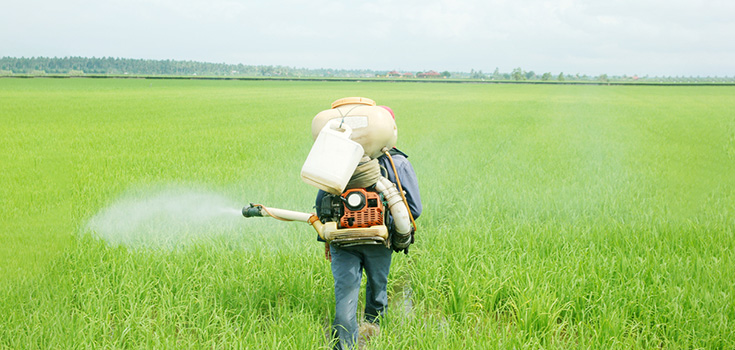USDA: Monsanto’s Roundup Herbicide Damages Soil

Following a report that U.S. regulators were completely aware of the fact that the best-selling herbicide product Roundup causes birth defects, the USDA is now announcing that it also damages the soil.
Monsanto’s Roundup Herbicide Damages Soil
USDA scientist Robert Kremer summarized the findings:
The heavy use of Monsanto’s Roundup herbicide appears to be causing harmful changes in soil and potentially hindering yields of the genetically modified crops that farmers are cultivating, a US government scientist said on Friday. Repeated use of the chemical glyphosate, the key ingredient in Roundup herbicide, impacts the root structure of plants, and 15 years of research indicates that the chemical could be causing fungal root disease, said Bob Kremer, a microbiologist with the US Department of Agriculture’s Agricultural Research Service.
Mother Jones reports:
Now, Kremer has been raising these concerns for a couple of years now—and as Tom Laskaway showed in this 2010 Grist article, the USDA has been downplaying them for just as long. Laskaway asked Kremer’s boss at the Agricultural Research Service, Michael Shannon, to comment on Kremer’s research. According to Laskaway, Shannon “admitted that Kremer’s results are valid, but said that the danger they represent pales in comparison to the superweed threat.”
So let’s get this straight: The head of the USDA’s crop-research service agrees that Roundup damages soil and thinks the superweed problem is even more troublesome.In the face of these two menaces, you might expect the USDA to intervene to curtail Roundup use. But Shannon meant his statement as a rationale for ignoring Kremer’s work. Meanwhile, the USDA keeps approving new Roundup Ready crops—ensuring that the herbicide’s domain over US farmland will expand dramatically.
Kremer commented on his employer’s reception of his work in a Reuters article last year:
“This could be something quite big. We might be setting up a huge problem,” said Kremer, who expressed alarm that regulators were not paying enough attention to the potential risks from biotechnology on the farm, including his own research…”Science is not being considered in policy setting and deregulation,” said Kremer. “This research is important. We need to be vigilant.”
Meanwhile, at a conference in Boulder, Colorado, in early August, another mainstream ag expert raised serious concerns about the poison, according to an account in Boulder Weekly. Iowa-based consultant Michael McNeill, who has a Ph.D. in quantitative genetics and plant pathology from Iowa State University, advises large-scale corn and soy farmers on weed control and soil fertility. He’s observing trends in the field that are consistent with Kremer’s research. Here’s Boulder Weekly:
McNeill explains that glyphosate is a chelating agent, which means it clamps onto molecules that are valuable to a plant, like iron, calcium, manganese, and zinc.…The farmers’ increased use of Roundup is actually harming their crops, according to McNeill, because it is killing micronutrients in the soil that they need, a development that has been documented in several scientific papers by the nation’s leading experts in the field. For example, he says, harmful fungi and parasites like fusarium, phytopthora and pythium are on the rise as a result of the poison, while beneficial fungi and other organisms that help plants reduce minerals to a usable state are on the decline. He explains that the overuse of glyphosate means that oxidizing agents are on the rise, creating oxides that plants can’t use, leading to lower yields and higher susceptibility to disease.
According to McNeill, problems with Roundup aren’t limited to the soil—they also extend to Roundup Ready crops and the animals that eat them.
McNeill says he and his colleagues are seeing a higher incidence of infertility and early-term abortion in cattle and hogs that are fed on GMO crops. He adds that poultry fed on the suspect crops have been exhibiting reduced fertility rates.
